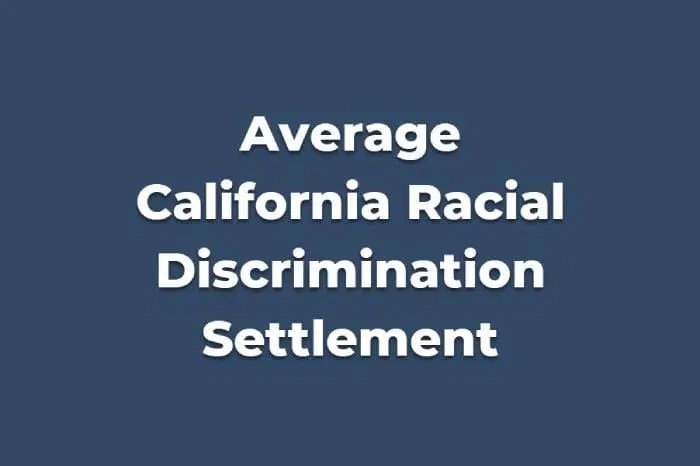
Average Racial Discrimination Settlement in California
Legally reviewed by: Jessica Anvar Stotz, JD, MBA
Short answer: The average California racial discrimination settlement ranges anywhere from approximately $25,000 – $100,000+. Settlement amounts often depend on factors like the size of the company and the evidence you have.
Racial Discrimination Settlements in California
| Complexity of Case | Settlement Amount |
| Minor | Approximately: $25,000 – $100,000 |
| Moderate | Approximately: $100,000 – $500,000 |
| High | Approximately: $500,000 – $1,000,000+ |
[lwptoc numeration=”none” title=”Racial Discrimination Settlements in CA Overview”]
Example California Racial Discrimination Settlements
- San Francisco settles racial discrimination lawsuit for $300,000
- Black former worker awarded $3.2 million in Tesla factory racial-harassment suit
- Settlement reached in favor of Black Bay Area couple lowballed $500K in home appraisal
- Kraft Heinz $30 million lawsuit: workplace ‘rife’ with racist slurs, threats
- PRC industries pays $400,000 to settle EEOC racial harassment, retaliation lawsuit
What Can You Get a Racial Discrimination Settlement for?
In a racial discrimination settlement, individuals may seek compensation for a variety of damages and harms resulting from the discrimination they experienced. Some common reasons for seeking a settlement in racial discrimination cases include:
- Employment Discrimination: This includes discriminatory practices such as hiring, firing, promotions, pay disparities, job assignments, or harassment based on race or ethnicity in the workplace.
- Housing Discrimination: Settlements may address discriminatory practices related to renting, buying, or accessing housing based on race or ethnicity.
- Educational Discrimination: Cases involving racial discrimination in schools, colleges, or educational programs, including issues such as admissions, disciplinary actions, or resource allocation, may lead to settlements.
- Public Accommodations: Settlements may result from discriminatory treatment in public spaces such as restaurants, stores, hotels, or transportation services based on race or ethnicity.
- Law Enforcement and Criminal Justice: Racial profiling, discriminatory policing practices, unequal treatment in the criminal justice system, or disparate impacts of policies and procedures may lead to settlements.
- Government Services: Discrimination in accessing government services, benefits, or programs based on race or ethnicity can also result in settlements.
These are just a few examples, and the specific reasons for seeking a racial discrimination settlement can vary widely depending on the circumstances of each case and the types of discrimination experienced by the individuals involved.
How to Know if You Might Have a Case
If you suspect you might have a case of racial discrimination, consider the following steps to assess your situation:
- Document Incidents: Keep a detailed record of any instances of discrimination you experience, including dates, times, locations, and descriptions of what happened.
- Review Laws and Rights: Familiarize yourself with federal, state, and local laws prohibiting racial discrimination in areas such as employment, housing, education, and public accommodations.
- Consult Legal Resources: Seek guidance from legal resources such as local civil rights organizations, legal aid societies, or attorneys specializing in discrimination law. They can help evaluate your situation and advise you on your rights and options.
- Assess Evidence: Gather any evidence that supports your claim, such as emails, texts, witness statements, performance evaluations, or documentation of discriminatory practices.
- Evaluate Damages: Consider the impact of the discrimination on your life, such as emotional distress, financial losses, career setbacks, or educational opportunities denied.
- Understand Statutes of Limitations: Be aware of the deadlines for filing discrimination claims, as there are time limits within which you must take legal action.
- Seek Resolution: Consider informal methods of resolving the issue, such as mediation or internal grievance procedures, before pursuing formal legal action.
- Consultation with an Attorney: If you believe you have a strong case, consider consulting with an attorney experienced in discrimination law to discuss your options and potential next steps.
*Remember that each case is unique, and the strength of your potential case will depend on various factors such as the evidence available, applicable laws, and the specific circumstances of the discrimination you experienced.
How to Know if You May Not Have a Case
You may not have a case for racial discrimination if:
- Lack of Evidence: You do not have sufficient evidence to support your claim, such as documentation, witnesses, or tangible proof of discriminatory actions or policies.
- Legitimate Business Reasons: The actions or decisions that affected you were based on legitimate business reasons unrelated to race, such as performance issues, qualifications, or organizational restructuring.
- Timing: Your claim is outside the statute of limitations, meaning you waited too long to file a complaint or lawsuit after the discriminatory incident occurred.
- Internal Resolution: You did not exhaust internal grievance procedures or alternative dispute resolution methods before pursuing legal action, if available.
- Not Protected by Law: The alleged discrimination does not fall under protected categories or areas specified by federal, state, or local anti-discrimination laws.
- Perception vs. Reality: The behavior or actions you perceive as discriminatory may not meet the legal standard for discrimination, as discrimination claims require evidence of intentional bias or disparate treatment based on race.
- Legal Advice: After consulting with legal experts, such as attorneys specializing in discrimination law, it is determined that your case lacks legal merit or is unlikely to succeed in court.
- Resolved Informally: The issue was resolved satisfactorily through informal means, such as mediation, negotiation, or internal resolution processes, and you do not wish to pursue further legal action.
*It’s essential to carefully evaluate your situation and seek advice from legal professionals to determine whether you have a viable case for racial discrimination.
What Factors Could Increase a Racial Discrimination Settlement?
Several factors can increase the likelihood of a higher racial discrimination settlement amount:
- Severity of Discrimination: The more severe and pervasive the discrimination experienced, the higher the potential settlement amount. For example, cases involving egregious acts of racism or systemic discrimination may result in larger settlements.
- Impact on Victim: If the discrimination had a significant impact on the victim’s life, such as loss of employment, emotional distress, or physical harm, it may lead to a higher settlement to compensate for these damages.
- Strength of Evidence: Strong evidence, such as documentation, witness testimony, or corroborating data, can strengthen the victim’s case and increase the likelihood of a favorable settlement.
- Publicity and Reputation: Cases that attract media attention or have the potential to damage the defendant’s reputation may lead to higher settlement amounts to avoid negative publicity and protect the defendant’s image.
- Defendant’s Resources: The financial resources and reputation of the defendant can influence the settlement amount. If the defendant is a large corporation or institution with substantial assets, they may be more inclined to offer a higher settlement to resolve the case quickly and avoid prolonged litigation.
- Precedent and Legal Precedents: Previous similar cases with high settlement amounts or court judgments can set a precedent and influence the settlement negotiations in favor of the victim.
- Legal Representation: Effective legal representation from experienced attorneys specializing in discrimination law can increase the chances of securing a higher settlement for the victim by advocating for their rights and maximizing compensation.
- Negotiation Skills: Skillful negotiation techniques employed by the victim’s legal team can lead to a more favorable settlement outcome by leveraging strengths, addressing weaknesses, and advocating for the victim’s interests effectively.
These factors, among others, can contribute to increasing the racial discrimination settlement amount and ensuring fair compensation for the victim’s damages and suffering.
Why Racial Discrimination Cases Can Be Difficult
Racial discrimination cases can be challenging due to several factors. Firstly, discrimination often occurs in subtle or indirect forms, making it difficult to prove intent or establish clear evidence of bias.
Additionally, victims may fear retaliation or lack the resources to pursue legal action, leading to underreporting and difficulty in gathering evidence. Moreover, discriminatory practices may be deeply ingrained within institutions or societal norms, making it challenging to effect systemic change.
Legal hurdles, such as the high burden of proof and complex legal procedures, can also impede victims’ ability to seek justice. Furthermore, societal attitudes and biases may influence jury perceptions and courtroom outcomes.
Overall, the multifaceted nature of racial discrimination, coupled with legal, social, and institutional barriers, contributes to the difficulty in addressing and resolving these cases effectively.
What Might a Racial Discrimination Lawsuit Look Like?
A racial discrimination lawsuit typically begins when an individual or group files a complaint alleging discriminatory treatment based on race or ethnicity. The lawsuit may involve various stages and elements, including:
- Filing of Complaint: The plaintiff (the individual or group alleging discrimination) files a complaint with the appropriate administrative agency, such as the Equal Employment Opportunity Commission (EEOC) for employment-related discrimination or the Department of Housing and Urban Development (HUD) for housing discrimination.
- Investigation: The agency conducts an investigation into the allegations, gathering evidence from both parties and any relevant witnesses. This may involve interviews, document review, and data analysis to determine whether there is reasonable cause to believe discrimination occurred.
- Mediation or Conciliation: In some cases, the agency may attempt to resolve the dispute through mediation or conciliation, facilitating negotiations between the parties to reach a settlement agreement without going to court.
- Filing of Lawsuit: If mediation efforts are unsuccessful or the agency determines there is reasonable cause to believe discrimination occurred, the plaintiff may file a lawsuit in federal or state court against the alleged discriminator. The lawsuit typically outlines the allegations of discrimination, the legal basis for the claims, and the relief sought.
- Discovery: Both parties engage in the discovery process, exchanging information and evidence relevant to the case. This may include documents, interrogatories (written questions), depositions (sworn testimony), and expert reports.
- Pretrial Motions: Either party may file pretrial motions to address legal issues or evidence admissibility, such as motions to dismiss, motions for summary judgment, or motions in limine.
- Trial: If the case proceeds to trial, both parties present their arguments, evidence, and witnesses before a judge or jury. The plaintiff must prove by a preponderance of the evidence that discrimination occurred.
- Verdict: The judge or jury renders a verdict based on the evidence presented at trial. If the plaintiff prevails, the court may award various remedies, including monetary damages, injunctive relief, and attorneys’ fees.
- Appeals: Either party may appeal the court’s decision if they believe legal errors occurred during the trial or if they disagree with the outcome.
Throughout the lawsuit, legal representation plays a crucial role in advocating for the plaintiff’s rights, navigating complex legal procedures, and pursuing a favorable outcome.
Benefits of Hiring an Attorney
Hiring an attorney for a racial discrimination case offers several benefits. Attorneys specializing in discrimination possess expertise in navigating complex legal procedures, gathering evidence, and can help give you potential settlement estimates.
They can provide invaluable guidance on the strength of the case, negotiate with opposing parties, and pursue maximum compensation. Attorneys also offer emotional support, helping clients navigate the challenges of litigation and empowering them to assert their rights effectively.
With their legal knowledge and experience, attorneys increase the likelihood of a favorable outcome and ensure that victims receive fair treatment and justice in the face of discrimination.
Connect with an Attorney
Have questions about a potential racial discrimination case in California? Give us a call any time to connect with some of the best racial discrimination attorneys in the state. All initial consultations are free.


